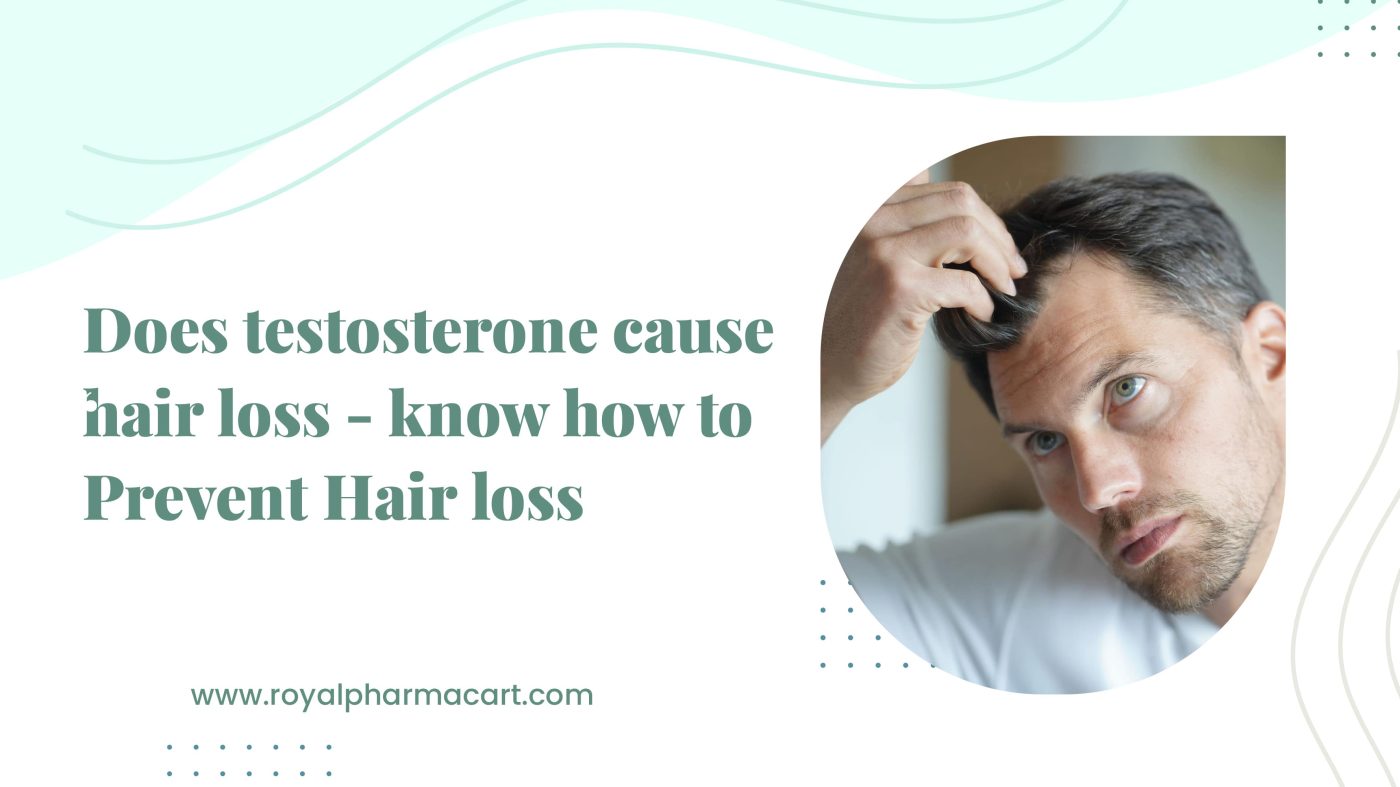Health & Wellness, Personal Care
Does testosterone cause hair loss
Does testosterone cause hair loss – know how to Prevent Hair loss.
Does testosterone cause hair loss, Testosterone is a key hormone that influences many bodily functions, including sperm production, maintenance of bone density, and more.
An imbalance in testosterone can have painful effects such as erectile dysfunction, loss of libido and hair loss.
While these are all common symptoms of low testosterone levels, testosterone replacement therapy (TRT) for treatment can also have side effects.
Does Testosterone Causes hair loss?
First of all, know that there are two types of testosterones: dihydrotestosterone (DHT) and “free” testosterone.
Testosterone is converted to DHT by an enzyme called 5 alpha-reductase. DHT is a more potent form of testosterone used by the body in the skin, prostate, and hair follicles.
Increased DHT activity in hair follicles can cause hair loss by shortening the hair cycle. DHT can shrink hair follicles, resulting in thinner, shorter hair.
Eventually, the hair fails to emerge from the follicle, resulting in hair loss.
Additionally, people diagnosed with low testosterone (low T) may undergo testosterone replacement therapy (TRT) to increase testosterone levels.
TRT may involve the use of testosterone gels, patches, or pills such as Cernos.
TRT increases the availability of testosterone to convert to DHT, which can lead to hair loss.
Overall, testosterone can cause hair loss by converting to DHT.
If you are experiencing hair loss due to high DHT levels Buy Finpecia (Finasteride) from our reliable pharmacy to prevent hair loss.
Testosterone replacement therapy and hair loss
While testosterone and hair loss are not always directly linked, there are some correlations between the two, which is why testosterone replacement therapy has become such a popular solution for many men. The first thing to remember is that low testosterone often affects the body hair on the chest, arms, legs or around the face and not so much the hair on the top of the head. Additionally, low testosterone levels can lead to many other side effects that can make hair loss much less severe. Low Testosterone can cause fatigue, muscle loss, depression, weight gain, erectile dysfunction, and low libido.
Replacing testosterone with pills, creams and patches can help combat some types of hair loss and help you regain your confidence. Of course, the first step is to check if your Testosterone levels are low.
How to prevent hair loss by taking testosterone
We repeat taking testosterone does not mean losing your hair. Male pattern baldness does not depend on the amount of T in the body, but rather on the sensitivity of the hair follicles to DHT.
While this increased sensitivity is genetically determined, there are some steps you can take to treat and minimize your risk of hair loss.
Ask a healthcare professional about the following hair loss treatment options:
Oral Finasteride. Finasteride is an FDA-approved treatment for AGA (at a dose of 1 milligram per day). Healthcare providers also prescribe finasteride tablets for benign prostatic hyperplasia (BPH), which is an enlargement of the prostate. How does it work? It prevents the body from converting testosterone to DHT – by about 70%.
Topical treatments. Not a fan of swallowing pills? Instead, opt for one of these prescription topical drug treatments:
- Finasteride and minoxidil topical spray. We’ve explained how finasteride works, so let’s talk about minoxidil. Experts aren’t sure how minoxidil (generic Rogaine®) works, but it appears to stimulate hair growth by shortening the telogen phase and lengthening the growth phase. Topical formulations of finasteride and minoxidil are available in liquid form. By the way: Evidence suggests that topical finasteride is as effective as oral finasteride and may be a better option for thinning hair than other types of hair loss.
- Minoxidil foam. This minoxidil topical foam contains the same medicinal ingredient as minoxidil spray, but in a mess-free formula.
- Minoxidil solution. This odorless minoxidil liquid solution is ideal for targeting hair regrowth on the crown or crown areas.
Low-level laser light therapy (LLT). Laser? Isn’t it usually used for hair removal? Unlike lasers that remove body hair, LLT uses low-intensity light to stimulate cellular activity, including hair follicles. In a 24-week study, 40 participants received daily treatments with a helmet-type LLT device or a sham device. After 24 weeks, those who received the LLT treatment had increased hair density and thickness.
Hair transplant. hair. The only problem is that, as you might imagine, hair transplants can be expensive and are usually not covered by health insurance.
Take your vitamins. Good nutrition is the key to a healthy body from head to toe – and that goes for your hair too. Many vitamin deficiencies can make hair more vulnerable to breakage and loss. Your doctor may recommend supplements like biotin to fill any deficiencies that may be causing hair loss.
Keep stress under control. You’ve probably heard it a million times: stress is bad for your health! In severe cases, this can trigger temporary hair loss, called telogen effluvium.
Be kind to your hair. Whether you have long, flowing Fabio-style locks or a short cut, taking care of your follicles can help reduce damage that could contribute to breakage and fall. Washing regularly with a product formulated for your hair/skin type can help prevent dryness that leads to brittle, fall-prone strands. We also recommend that you minimize chemical treatments and dyes.
Final word
Testosterone is a key hormone that regulates libido, bone density, and more. An imbalance in testosterone levels (T levels) can lead to loss of libido, anxiety, fatigue, etc.
Some people also experience hair loss when they have low testosterone or start taking testosterone replacement therapy (TRT) to boost testosterone levels.
Now you may be wondering, “Does testosterone cause hair loss?”
DHT, a more potent form of testosterone, can cause hair loss. This can cause the hair follicles to shrink and shorten the hair growth cycle, resulting in hair loss.
TRT can cause hair loss by increasing the availability of testosterone which can be converted into DHT. Higher DHT means greater DHT activity in the hair follicles, resulting in hair loss.
Apart from this, TRT can also cause side effects such as enlarged prostate, decreased sperm count, and sleep problems.
It is recommended that you consult a healthcare professional before taking TRT to understand the risk of side effects.
If you suffer from hair loss due to TRT or elevated DHT, consider taking medications such as Finasteride. It can inhibit the conversion of testosterone to DHT, thus preventing hair loss.
Lifestyle changes, such as a balanced diet and regular exercise, can also help reduce hair loss.
FAQs.
Can hair care products make testosterone-induced hair loss worse?
Some aggressive hair products and treatments can damage your hair and cause it to fall out. But their direct link to testosterone-related hair loss is limited.
Are there natural ways to prevent testosterone-related hair loss?
Maintaining a healthy lifestyle, managing stress, and using gentle hair care practices can help promote healthy hair. But their direct impact on testosterone-related hair loss may be limited.
Do all testosterone replacement therapies cause hair loss?
Hair loss can be a side effect of some testosterone replacement therapies.
Consulting with a healthcare professional can help you choose a treatment with a lower risk of potential side effects.
Can only men experience hair loss due to testosterone?
No, women also have testosterone in their bodies and high levels of DHT can also contribute to hair loss in women.

